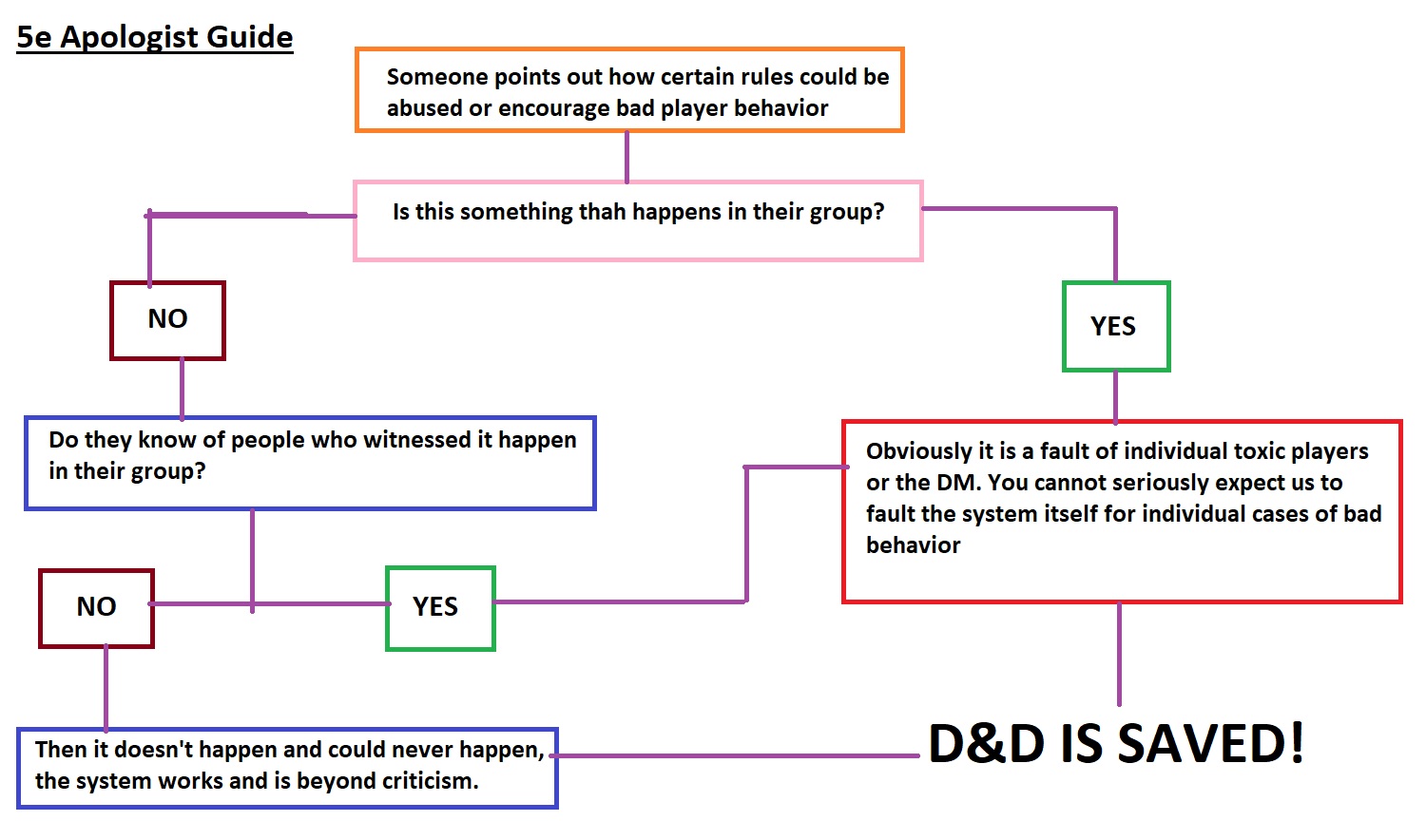this post was submitted on 10 Oct 2024
165 points (90.6% liked)
RPGMemes
13815 readers
1939 users here now
Humor, jokes, memes about TTRPGs
founded 2 years ago
MODERATORS
you are viewing a single comment's thread
view the rest of the comments
view the rest of the comments

Every edition of every ttrpg has had rules that can be exploited and abused, and the solution has always been for groups to alter rules as necessary. It's impossible to make an airtight ruleset. You are just a 5e hater.
Considering I've been running 5e since the Plague Year, I wouldn't call myself a hater. I did notice, however, this very pattern whenever I voice concerns about anything with the rules - first people assume whatever flaw or exploit I point out, has been used in my group and then their solution is always to leave the group or kick someone out of it, and if it didn't happen in my group, then it means it doesn't ever happen. It's a catch-22 debating with these people.
My hypothesis is that a lot of people are emotionally invested in DND, and if you say bad things about it then it feels like you're saying bad things about them. Saying it didn't happen or it was the players fault let's them still feel good about DND.
We're all susceptible to this.
For some reason DND fans seem less likely to just go "yeah it's kind of garbage but I like it"
As some who argues about the rules a lot, most people know close to nothing about the actual, written rules.
If you do want to debate with someone about the rules, feel free to message me, I enjoy it much more than I should.
It's impossible to make it perfect, but it's trivial to make it better. For example, get rid of Silvery Barbs.
And we'd really hope with a large corporation behind it, they could do more than get rid of the obvious. They could do the playtesting necessary to properly balance martials vs casters.
It's a sourcebook they charged money for. They couldn't have bothered to do basic playtesting to earn that money?
And there's plenty more where that came from. Between a Shadow and a Tarrasque, one can safely be beaten by a low-level party, and the other is a threat to the whole world. The CRs reflect that, except they're backwards.
In fairness, caught early, Shadows wouldn't need a level 20 party to stop them. But they're still above CR. And with the Tarrasque, all they had to do was leave in the anti-cheese measures they already had. And steal all the immunities from Pathfinder.
Speaking of CR, that was a bad way of doing things. Sure it's convenient if you have a party of four players fighting a monster, but if you have to figure out how to recalculate it based on different party sizes, you may as well just use level to begin with and then figure out what level would challenge your players. Then it would work just as well on enemies with class levels. And it would mean Polymorph could be at least somewhat close to being balanced. As it is, a single spell can turn one party member into a monster capable of challenging for characters of that level, and then when defeated, they still just turn back.
That's true for games in the tradition of D&D/F20/Trad, but not all ttrpgs. Fewer rules, a tighter scope and more elegant design make it much easier to rule out the kind of bad interactions or edge cases that lead to rules that run counter to the game's purpose.
My Life with Master, Fiasco and Fall of Magic are all games i've played, where exploitation or abuse of rules is just not possible. Unbound is a tactical combat rpg without any room for abuse of rules.
John Harper's rules-lite DW hack World of Dungeons is probably too elegant for abuse to be possible.
That's the first few that I can think of, but i'm sure there are plenty more.
my Lasers & Feelings officer is absolutely unbeatable when it comes to lasers. he does suffer a bit when it comes to feelings though
Yep, another great example. When you have as few rules and as tightly focused a scope as lasers and feelings, every single situation the rules can generate is going to be on theme.
I agree and I’d take it one step further: it’s undesirable to play games with elaborate exploit / abuse guards. Those systems suck! They’re boring, same-y, and labyrinthine. I literally don’t care about pvp, or balance, or “winning”. It’s not that kind of game play
The nirvana fallacy is to substitute a good solution (fix a broken rule or exploit) with a perfect solution that is obviously impossible (create an airtight ruleset), then use that to justify doing nothing.
i wanna see someone run a broken build in Yazeba's Bed and Breakfast